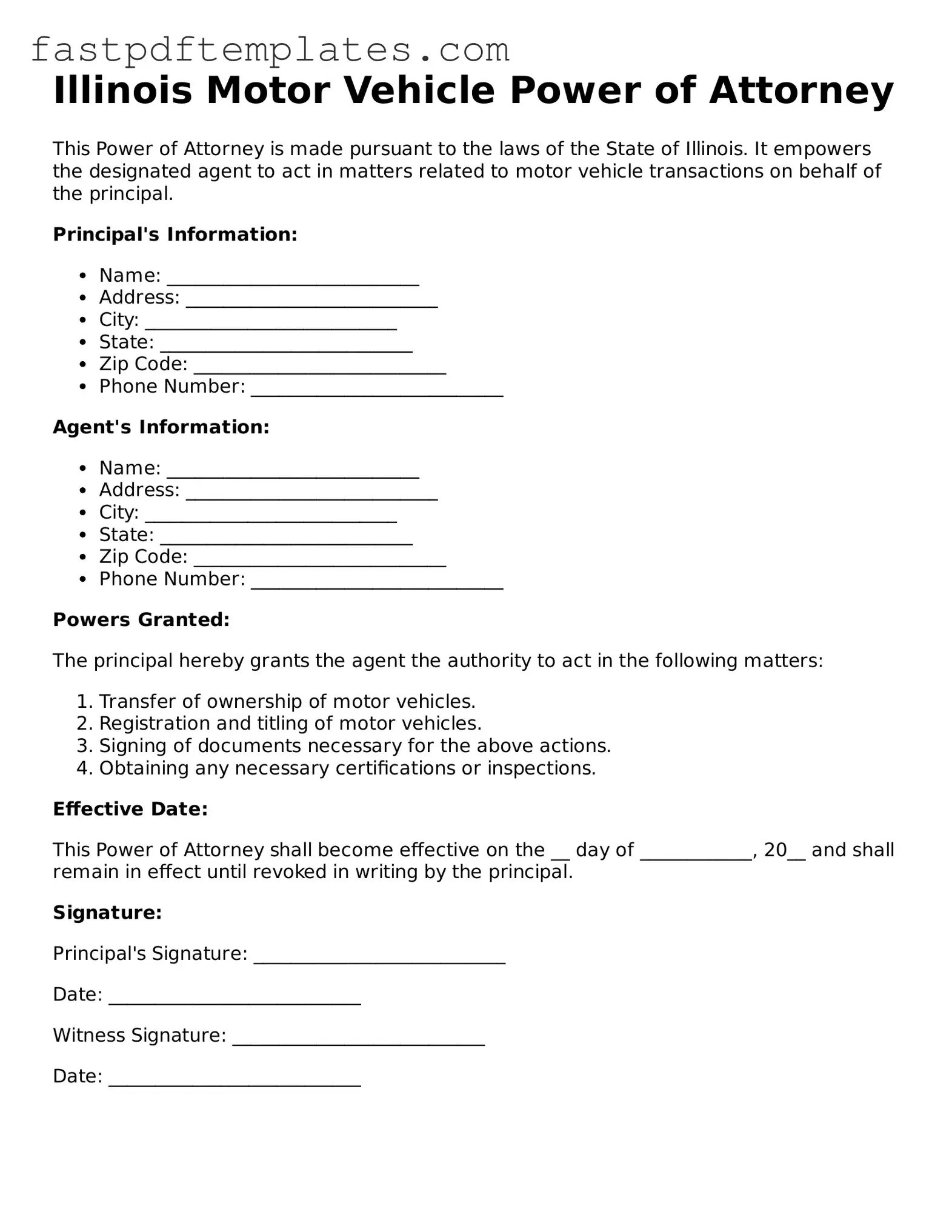The Illinois Motor Vehicle Power of Attorney form is similar to a General Power of Attorney. Both documents grant authority to an individual to act on behalf of another person. In the case of the General Power of Attorney, the scope is broader and can cover various financial and legal matters, not just limited to motor vehicle transactions. This means that while the Motor Vehicle Power of Attorney is specific to vehicle-related actions, the General Power of Attorney can allow for a wider range of decisions, from managing bank accounts to signing contracts.
Another document that shares similarities is the Durable Power of Attorney. Like the Illinois Motor Vehicle Power of Attorney, the Durable Power of Attorney allows someone to make decisions on behalf of another person. However, the Durable Power of Attorney remains effective even if the person granting the authority becomes incapacitated. This ensures that decisions can still be made regarding the individual's affairs, whereas the Motor Vehicle Power of Attorney typically ceases if the principal is no longer able to make decisions.
The Healthcare Power of Attorney also resembles the Illinois Motor Vehicle Power of Attorney in that it allows one person to make decisions for another. This document specifically pertains to medical decisions, granting authority to make choices about healthcare and treatment. While the Motor Vehicle Power of Attorney is limited to vehicle-related matters, both documents empower an agent to act in the best interest of the principal.
A Limited Power of Attorney is another document that is similar in nature. This form provides specific powers to an agent for a limited purpose or timeframe. For example, a Limited Power of Attorney might be used for a single transaction, such as selling a vehicle, much like the Illinois Motor Vehicle Power of Attorney. The key difference lies in the scope; the Limited Power of Attorney can be tailored for various specific actions, while the Motor Vehicle Power of Attorney is exclusively for vehicle-related transactions.
The Real Estate Power of Attorney also shares commonalities with the Illinois Motor Vehicle Power of Attorney. Both documents authorize an individual to act on behalf of another person, but they are focused on different areas. The Real Estate Power of Attorney allows the agent to handle matters related to real property, such as buying, selling, or managing real estate. In contrast, the Motor Vehicle Power of Attorney is specifically designed for vehicle transactions.
The Financial Power of Attorney is another document that is similar to the Illinois Motor Vehicle Power of Attorney. Both grant authority to an agent to manage another person's affairs. However, the Financial Power of Attorney covers a broad range of financial matters, including managing investments and handling bank transactions. This contrasts with the Motor Vehicle Power of Attorney, which is limited to actions involving motor vehicles.
The Business Power of Attorney is also comparable to the Illinois Motor Vehicle Power of Attorney. This document allows someone to act on behalf of a business owner in business-related matters. While the Motor Vehicle Power of Attorney focuses on vehicle transactions, the Business Power of Attorney can encompass a variety of business decisions, including signing contracts and managing business operations.
Lastly, the Special Power of Attorney is similar in that it grants specific authority to an agent for particular tasks. Like the Illinois Motor Vehicle Power of Attorney, the Special Power of Attorney is used for defined actions and can be limited in scope. The key distinction is that the Special Power of Attorney can cover various subjects, while the Motor Vehicle Power of Attorney is strictly related to motor vehicle issues.

